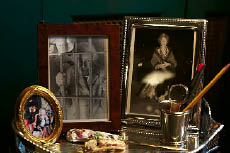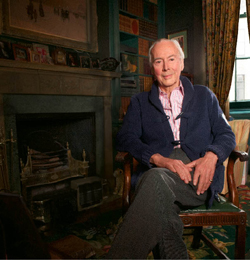The Accidental Educator
Samuel Peabody set out not to be a teacher. He now defines himself as one in the broadest sense
Most people would describe him as a philanthropist, but Samuel Peabody has always found that word “too high falutin.”
“When I’m asked, I say I’m a teacher,” he says.
That may sound disingenuous coming from the man who helped found such fixtures on New York City’s charitable landscape as Reality House and Prep for Prep, and who presided over the Citizens Committee for Children. But Peabody—who did indeed teach fourth grade at New York City’s St. Bernard’s School and also served as lower school head at Rye Country Day School—wears his celebrity lightly. He’s not likely to tell you, for example, that he’s a direct descendant of John Endicott, founder of the Massachusetts Bay Colony in 1629; Joseph Peabody, builder in the 18th century of one of Salem’s largest fleets; Francis and Oliver Peabody, founders of the investment firm of Kidder, Peabody; and Endicott Peabody, who founded the Groton School (FDR went there).
He will, however, flash a mischievous grin and (if you happen to be visiting him in the Fifth Avenue apartment where he and his wife have lived for the past 52 years) hand you a framed photograph of an elegant, white-haired woman peering out from behind bars: his mother, Mary Parkman Peabody, who at 72 got herself arrested in St. Augustine, Florida, in 1964 for attempting to eat at segregated restaurants with black friends. The jailing of a woman who was both the mother of the governor of Massachusetts (that would be Sam’s brother, also named Endicott Peabody) and the wife of a prominent Episcopal bishop made international news and focused the spotlight on the sit-ins and protests in St. Augustine that set the stage for passage of the Civil Rights Act.
“At the time that it happened, my sister, who was very strong on civil rights”—the late Marietta Peabody Tree, who served under President Kennedy as U.S. representative on the United Nations Commission on Human Rights, a post initiated by Eleanor Roosevelt—“was vacationing in Barbados with her husband, who was Anglo American, and it so happened that the Queen Mother was their dinner guest. My sister spent much of the evening very anxiously listening to the radio—not because she was worried about my mother, but because she felt it would be a waste if she’d only gone from restaurant to restaurant without getting arrested. She kept muttering, ‘Why don’t they say whether she’s been arrested?’ And finally, when the Queen Mother said goodbye, she said to my sister, ‘I do hope your mother gets arrested soon.’”
Peabody seems to share his mother’s rebellious streak, doing his level best upon completing college and military service to avoid becoming a teacher. “My grandfather had founded Groton, an uncle was headmaster of St. Mark’s [a rival prep school in Massachusetts], and my father and another brother were clergymen, so education was more or less the family business,” he recalls. “So I decided I wanted to be a banker.”
He hired on as a trainee in the credit department of Hanover Trust and spent two years on Wall Street, until, as he tells it, “I came back from lunch one beautiful Indian summer day to a desk full of papers and said, ‘I don’t care about any of this,’ and went up to personnel and quit. One friend, this starchy New England woman, said, ‘I knew you wouldn’t last—you always wore blue shirts.’”
He called St. Bernard’s, where his former Latin teacher from the school he had attended as a boy was now the headmaster, and asked, “Is there something I can do there while I think about what I really want to do?” He was promptly put to work taking the boys out to Central Park to play soccer and substituting for absent teachers. Soon Peabody realized that this was, in fact, what he wanted to do, and he decided to spend the following year at Teachers College to truly learn his trade.
“It was the first time I ever got an ‘A’ in my life,” he recalls. “Due to being a dyslexic, I had never been a particularly good student, but by now I was a war veteran, I’d worked in a bank and a school, and I felt I knew something and was ready to learn.” He taught at TC’s Agnes Russell School on the Columbia campus and also at “an overly permissive school on the Upper West Side” where the students were actually glad when he asked them to hit the books instead of go skating. After getting his degree, he taught for eight more years at St. Bernard’s and was principal of the lower school at Rye for a decade, once enduring a memorable tirade from Martha Mitchell when he recommended that her daughter be kept back in kindergarten. (Mitchell called him “Mr. Peacock” and threatened to ensure that a proposed bridge to connect Long Island and Westchester would be built directly over the school.)
He came away believing that “a teacher, however specialized, should be a teacher of all things—bigger things, like how to conduct oneself in the world.”
Peabody’s subsequent career has certainly met that standard. In the late 1960s, Peabody and his wife—Judy Peabody, who would later become known as a pioneer in funding AIDS care and advocacy—helped found Reality House, a drug rehabilitation center in northern Manhattan. Sam Peabody served as chairman, while Judy Peabody worked as a group addiction counselor.
He did that for 17 years before fundraising and becoming director for another nonprofit, Broad Jump, which hired teachers at sites around the city to work on weekends and during the summer with students at risk for dropping out of high school. It was then that Peabody was visited by Gary Simons, a young teacher in the Bronx who wanted to start a program to place promising students of color in independent schools throughout the Northeast and help support them through to college.
Peabody pitched Simons’ idea to Broad Jump’s board, and Prep for Prep was born. Today it boasts more than 3,800 alumni in leadership positions in different fields, and in 2008, Mayor Bloomberg declared November 29th “Prep for Prep Day.”
Eventually, Peabody moved on to become chair of Citizens Committee for Children, which advocates for children’s and family issues and amasses research to help legislators in Albany at budget time to restore funds to key social programs.
As he takes stock of the world from his present vantage point, Peabody is both optimistic and somewhat chastened by the cyclical nature of social progress. American public schools are, in his view, at a low point, prompting him to hope fervently that “Obama takes his campaign promises seriously.” Educational fads like phonetic spelling come and go. On the other hand, people look to teachers with even greater urgency than they did 30 years ago.
“Recently, a former student called me to say, ‘I just wanted to show you I turned out all right, and to tell you how much you meant to me.’” Peabody’s voice catches. “It’s a gift, to hear something like that.”
Published Wednesday, Jun. 2, 2010

